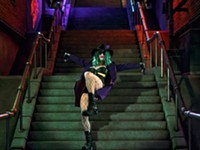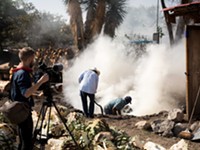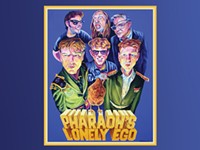[
{
"name": "500x250 Ad",
"insertPoint": "5",
"component": "15667920",
"parentWrapperClass": "",
"requiredCountToDisplay": "1"
}
]
The High Falls Film Festival kicks off this Thursday, celebrating its 16th year of spotlighting women in film. On opening night, the festival will screen "Seeing is Believing: Women Direct," Cady McClain's documentary about the experiences of female filmmakers. Through interviews with several notable women directors, McClain explores the challenges they face thriving in a male-dominated industry.
McClain will be in Rochester on Thursday, November 2, for the screening and to participate in a Q&A after the film. Begins at 8:30 p.m. Check highfallsfilmfestival.com for ticket information.
In a long interview, CITY spoke with McClain about what spurred her to make the film, what Harvey Weinstein says about our culture, and a hope to inspire the next generation of female directors. An edited transcript of that conversation follows.
CITY: You worked as an actress for some time before starting to direct. At what point did you decide you wanted to try your hand behind the camera as well?
Cady McClain: It's kind of a funny story. I started studying directing when I was 22 with a guy named Curt Dempster. He was the artistic director of the Ensemble Studio Theater in Manhattan. This was in the early 90's. And I totally fell in love with it. I'd just been on a soap a couple of years, and I felt like, "Oh my god, this is it! This is what I want to do. I'm good at it. I can handle it." I just loved it. So I went to my mom, and I said, "I've discovered what I want to do for a living. This is the greatest thing ever."
And she begged me not to. She felt like it was an unsafe place for a woman. She didn't think that I would be able to make any money. She didn't think that women in positions of leadership were really that many, or were able to even have much of a career. And she really pressured me to just drop it. She had cancer, and at the time I was financially supporting her. So I had this responsibility to take care of her. She felt unsafe about me pursuing it, and she was dying.
And so I didn't. I dropped it, and it was really excruciatingly painful. It's very depressing. But I started going about it in little bits and pieces. I would do performance art, which is very self-creative; I would write world music. I went to art school and I did large-scale paintings — anything that was part of being the visionary or the person who was proactive in creating the story of whatever it was you were doing. I found other ways to sort of satisfy that need.
But it wasn't until my early 40's where I had an idea for a script, and just for the fun of it, I wrote it. My boyfriend — who is now my husband — and another friend said, "You should direct this. Do it. Do it. Do it!" Real strong encouragement to do it. That's when I got back into it really more strongly, and as soon as I hit the ground doing that, I was just like, "Oh my god, this is the best thing ever."
My mom passed many years ago, so there was really nothing stopping me from doing it. And immediately four months later, I did another one. And then I began to discover at film festivals at the time — and this was a couple of years ago — there just weren't that many women being represented. Or there just weren't that many women, period. It was just heavily dominated by men, and I was just really frustrated.
You know, this is not a medium that requires a certain gender, it requires imagination. It requires the ability to talk to people, to communicate, and collaborate. It does not require a male body to do this job. And then all of the statistics started suddenly rolling out. And I went, "OK I have to do something about this. This is something that I really love, and I'm either going to be part of the solution or I'm going to just sit back and just watch this problem continue." I just didn't want to be an observer about it.
And that's what got me to start interviewing women who had been directing for long periods of time, and who were overcoming obstacles. Because I really wanted — for both myself and for other women — to show mentors that we could have access to. I thought I could give mentorship to more women, the kind of mentorship I wish I had. And so that's how this whole project came about.
It's interesting that your mother expressed reservations about you directing. Did you find that type of mindset was common?
What was really interesting was when I met other women and I said, "Yes, I'm doing this, too." It was almost like, "Oh thank god, there's another one of us. I'm not the only one." Because that's kind of part of the problem: we're oftentimes discouraged or driven out through various forms of aggression or harassment.
I mean I'm just now doing some very deep thinking about all this — as many of us are —about what stops you from pursuing something that you love. And it wasn't overt, a lot of times. It was it was more like a subtle thing; a subtle resistance to take your direction. Whereas if it was a man, I would watch the man give direction and there would immediately be an acceptance of his authority. And I think that's been really the big thing I've been wondering: why is there this resistance to take a woman seriously when she's the one leading? Why are we so quick to criticize her, or to say that she's taking a "man's role"?
I think it's a big conversation that we're all having culturally right now, about what is good leadership. And again, to be a leader does not require a male body. It requires good values, and ethics, and morals, and a certain strength. It takes an ability to listen, to collaborate, to care about other people and their well-being. And that is not gender specific.
Related Preview: High Falls Film Festival 2017

When you started interviewing other female directors, was it always your intention to turn those interviews into a film?
I started out with the idea I'd make a feature, and then because I was interviewing so many women, the problem became, "How am I going to fit all these women into a single film?" So then I thought I'd turn it into a series. [Laughs] Do you know how difficult that is? It's like saying, "I'm going to make a five-hour movie," as opposed to, you know, a 90-minute movie, or even an hour-long movie. So I thought, "OK. Well, let me start small."
I cut a short version of what's now the film. I said, "Let me just test this out. Am I on the right track? Am I nuts? Let me send it to some film festivals and see if it gets any kind of response." I just needed to get some feedback other than from friends. And the feedback was amazing, and the Soho Film Festival actually called me up and they said, "You've got to turn this into a feature. Can you do it? Because we think it would be very competitive and we really want to show something like this in our festival."
I was really encouraged by that, and I said, "OK, give me give me a couple of days; let me give you a very rough idea of what I can do." And they accepted it. And long story short, we won the Audience Award for Best Feature at the festival, which is really, really great. And that sort of propelled me to continue to refine it, polish it, and send it out to other festivals to see whether I had captured what it is I wanted to say.
And also the point of doing this is that I want women, wherever they are in the world, whatever age, gender identification, race, size — however uniquely they define themselves — to be able to spot some piece of themselves in this film. Whether they're very successful, or whether they've just made a short film, or they haven't made a film at all, to see something in this film that encourages them to keep going — because I think what happens is a lot of people drop out. It gets too hard, they get discouraged. Or it becomes very expensive, whether you're pursuing an education or you're just trying to do it independently.
Were there things that you were surprised to hear from the filmmakers you talked to?
Yes, but kind of in the strangest way. The thing that was so incredibly touching to me was their courage — just incredible strength and courage, from so many of these women.Kimberly Peirce for example; I mean she was one of the first to really go out there on a limb and tell a unique story with "Boys Don't Cry." And how much courage that took. I was really, really touched by that. Even Sarah Gavron; she went through nine short films before she got a break and got an agent. That's a lot. So this willingness to endure, to stick it out and not quit — I thought that was just incredibly compelling and something I felt was important to make a part of this.
In the wake of the Harvey Weinstein scandal, there's recently been a lot of discussion about sexism and the general imbalance of power in Hollywood. What's been your impression of the conversations that have been happening? Do you think they're a sign that things might actually start to change?
It's wonderful that the skeletons are being let out of the closet. I started acting when I was 9 years old in Los Angeles, and at 15, I started to get hit on pretty hardcore. By 16, I was begging my mother to move us to New York City, which we did. And so I've known about this and have experienced it all throughout my career, even in New York. But in Hollywood, it was absolutely the sense of feeling like shark chum. You're the meat that's thrown in the water for the sharks to come circling. And it's a bad feeling. Disrespect is like the least of it. It's really quite hideous, and it has been so for many, many years.
And so I'm excited; and I'm horrified. I'm excited that the conversation is happening. I'm really thrilled that there's so many men stepping up to say, "I'm sorry," or "I'm sorry, I knew and I should have done something more" — being accountable. Or production companies, like ShondaRhimes's, making sure that everyone knows they have a zero tolerance policy. One strike and you're out. Which I think is actually really important. And I hope more production companies take on that policy. Again, it's one of those ways to stop people from being creative, to stop people from pursuing their art. And whether they're called to be an actor or they're called to be a director, it's really an ugly abuse of power. And it should not be a part of this business.
I'm glad that it's all getting revealed, and it will take some time, but it will hopefully soon begin to sweep out the trash. I hope it'll have a larger resonance in our culture. To a great degree in our culture, we look to the arts to guide us. And if that's an acceptable standard in the arts, then it becomes an acceptable standard everywhere else. I think I'm starting to see it having an effect in other industries — with Terry Richardson, the fashion photographer, or John Besh, the chef. People are starting to say something. I'm glad — because not every person is like that. Not every guy is like that; not every woman indulges or accepts that behavior. It's a percentage, but they've been an influential percentage, and I'm really happy that they're getting called on it. It's about time.
What role do you think festivals like High Falls, which shines a light on the work of female filmmakers and women-centric stories, can play in that overall conversation?
I find it's really interesting how many men do attend these festivals and want to engage in the conversation and want to participate in this understanding of the narrative that they don't necessarily get exposed to anywhere else. It's a place for women to be heard and valued, and to recognize the worth of these stories and of our history of coming to equality.
I think their existence helps us recognize that there's a need for gender balance in our narratives. It shows that there's a need for these stories in our culture; that they can't be pushed to the side. Soap operas used to be the only place where women could have a lead role, and not so long ago. You rarely saw it unless it was like a Lifetime movie specifically for women. It was really quite genre-ized. And I think that's changing in a big, big way.
There are so many stories that can be told. We're 50 percent of the population for crying out loud. And it's thrilling to me to sit and watch films by and about women, because I still don't see enough of them. I mean Jane Campion can only do so much. [Laughs] You know, "The Handmaid's Tale" was like a revelation. And it's a sign that there's a shift happening right now. Those film festivals have been carrying the torch for some time, saying, "Hey, this is the way. These stories are just as valuable." And so I think it's really important to support those festivals that have been shining a light on these stories for some time. And are continuing to, despite what's going to be a bumpy ride — without a doubt — in Hollywood and the entertainment industry.
In the film you say that role models are the key to developing the next generation of filmmakers. Who would you say have been your role models?
You know, the film "Orlando," directed by Sally Potter, was a real revelation to me. Because it was a story about a woman who would go through many lifetimes; sometimes she was a man, sometimes she was a woman. For me, that was incredibly liberating because it really sort of put the focus on the human spirit. And that was the more important thing to focus on in your life, whatever your gender. You should not allow yourself to be limited by the way others define you, or by wherever you land physically. And also it's a beautifully shot film and was just so gorgeous.
More recently, I have to say Sarah Gavron. Both "Brick Lane" and "Suffragette."
Just gorgeously shot. I mean these are elegant films, and that's really what I strive to create myself. You want to tell an important story, but you also want to tell it visually in a way that just knocks you out. And I want to help more women strive for that. So certainly I would say Sarah and Sally Potter — and gosh, there's so many.
Amy Heckerling is somebody that is important to remember. She did "Clueless," and it was such a fun, popular film showing young women in a really different way. I think she really deserves more of a spotlight. Oh, and Ida Lupino. I watched "The Hitch-Hiker," and you could not tell me that was a "woman-directed film" — that was just a great film. That just knocked my socks off.
And Agnès Varda. I think she's going to be given an honorary Oscar this year, which is so well-deserved. They call her "The godmother of the New Wave." She and other artists like her just show what's possible when you stretch your imagination and you don't wait to be accepted. Just do it because you love it. Hollywood's a tough town, but just because you maybe don't get a studio film doesn't mean that you shouldn't make movies. That's one of the great things about short films or micro-budget films. I just want more women to be making movies because the more you do it, the better you get at it. And if you stop you're not going to grow.
Speaking of...
-
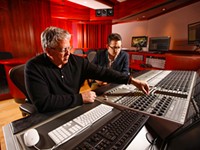
Interview: Beal Institute Director Mark Watters
Jun 27, 2018 -

New Year's Eve 2017 Guide
Dec 27, 2017 -
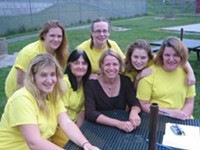
Filmmaker Signe Taylor hopes change is in the air
Nov 3, 2017 - More »



